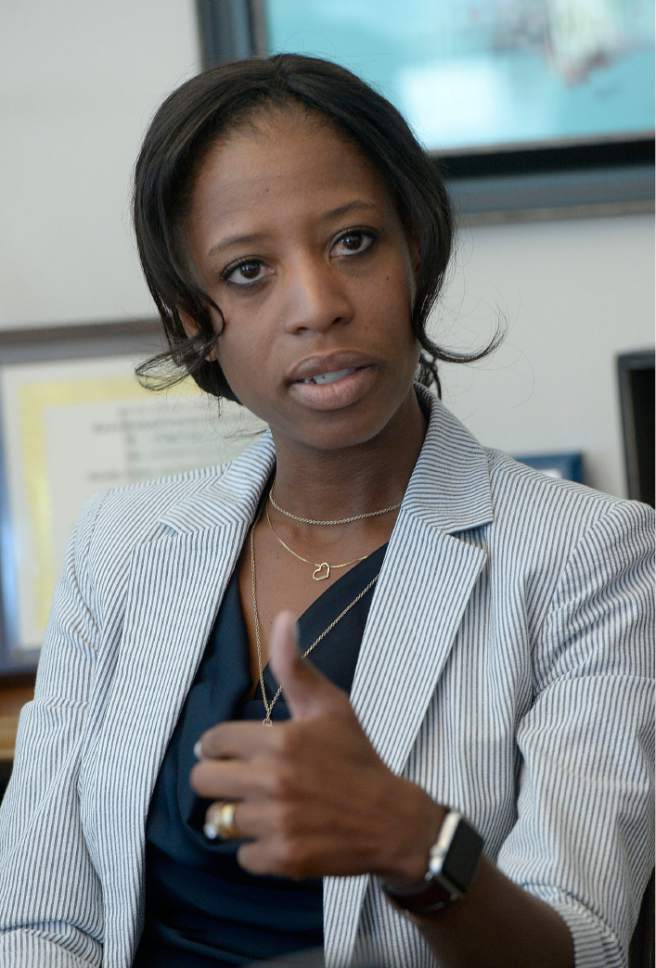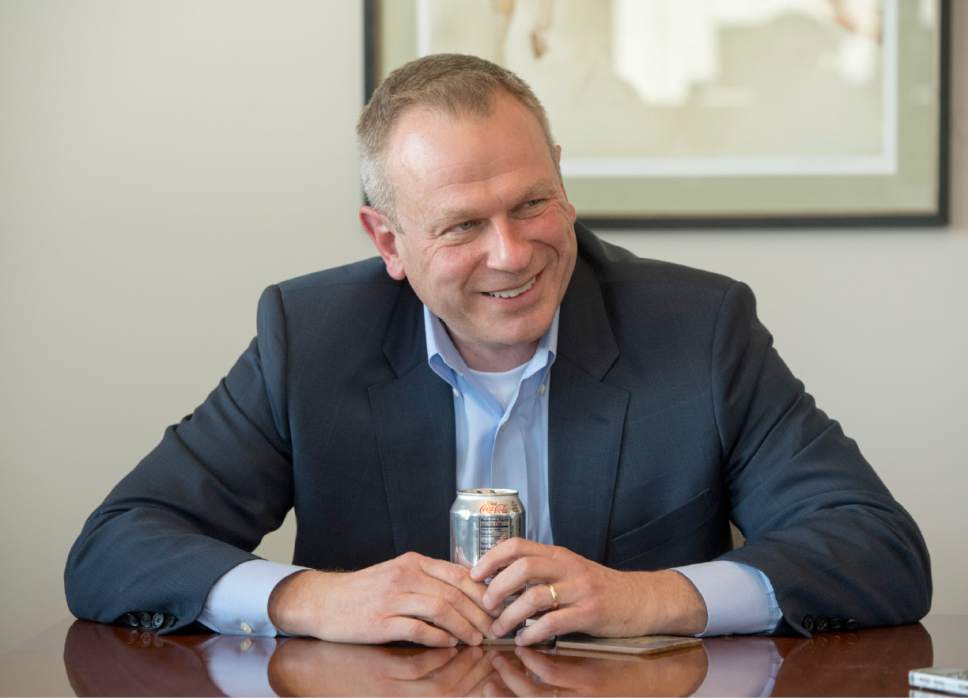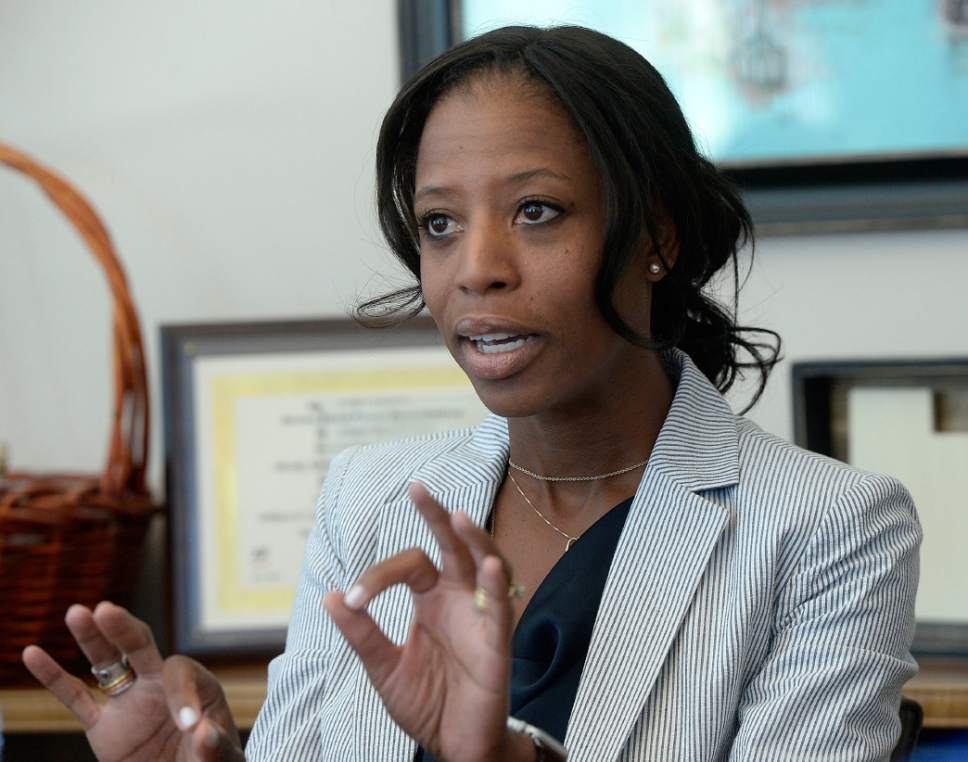This is an archived article that was published on sltrib.com in 2016, and information in the article may be outdated. It is provided only for personal research purposes and may not be reprinted.
Time may be running out for Doug Owens as he attempts to oust first-term Rep. Mia Love in a 4th District rematch centered on style rather than policy disagreements.
A new poll conducted for The Salt Lake Tribune and the Hinckley Institute of Politics shows Love leading Owens by 12 percentage points, 50 percent to 38 percent, with Election Day fast approaching. The poll found that 41 percent have already cast a ballot, mostly by mail.
"Doug Owens has struggled to find a set of arguments to convince voters to throw her out of office and make a change there," said Chris Karpowitz, a political scientist with Brigham Young University who has followed the race closely.
The candidates have different stances on a number of issues. For example, Love is against raising the minimum wage, while Owens wants to, though he doesn't know how much.
She wants the government out of the student-loan business, while he wants the feds to lower interest rates on those getting a higher education.
She voted against the latest federal education law, meant to give states more leeway on standardized testing, while he backs it.
But the Democrat's most persistent line of attack has been Love's use of taxpayer-funded mailers, which he considers "self-promotion." The Republican congresswoman has spent about $275,000 on the mailers, far more than the rest of Utah's federal delegation combined. She said these legal mailers were necessary to let the public know about her new congressional office.
The candidates jousted over the mailers at their only debate, and Owens has mentioned them in critical TV ads and his own persistent mailers.
Karpowitz doesn't believe these jabs have been effective.
"The glossy mailers is just not going to be the thing to convince large numbers of people to change their votes," he said.
Owens lost to Love by 5 percentage points, about 7,500 votes, in 2014. Since then, he has spent much of his time meeting with community groups and raising money. He's promoted himself as a pragmatic moderate with rural Mormon pioneer roots.
"When people get to know me, they'll vote for me," he said. "I've staked two years of my life on it."
The Tribune-Hinckley poll, conducted by Dan Jones & Associates, found that 47 percent of likely voters had a favorable view of Owens, while 35 saw him unfavorably and 18 percent said they didn't know. Love had a 51 percent favorable rating, 45 percent unfavorable and 4 percent said they didn't know.
The survey also showed:
• Owens has the support of 92 percent of Democrats, while Love is backed by 82 percent of Republicans. Independents are breaking toward Owens, 46 percent to 38 percent.
• While both candidates are members of The Church of Jesus Christ of Latter-day Saints, Love has a major advantage with active Mormon voters, leading 74 percent to 16 percent. Owens does better with somewhat active (47 percent for Love and 43 percent for Owens), and he has a 2-point edge with nonactive Mormons.
Love's overall lead is down from polls in September that showed her up by as much as 19 percentage points. Still, her campaign believes she is on a glide path toward a second term.
"We feel very good," said Dave Hansen, Love's campaign strategist. "Looking at the numbers, it is obvious their attack ads are not necessarily working against Mia, and people feel confident in having her as a representative."
The Owens campaign believes the Tribune-Hinckley poll is an "outlier," pointing to a poll from the Democratic Congressional Campaign Committee putting their candidate down by 8 points.
"We're confident in our polling, as well as independent polling, that show a very close race," said Taylor Morgan, Owens' campaign spokesman. "One thing is clear in all the polls: Doug is gaining ground every day. We're confident about where we are going into Election Day."
The Democrat also believes turnout in a presidential election year will give him a boost. Recent spending suggests outside groups representing House Republicans and Democrats believe this race is still competitive.
The Congressional Leadership Fund tied to Republicans and the House Majority PAC on the Democratic side each has spent $350,000 in recent days to promote the candidates.
That's on top of the $4.9 million Love brought in and the $2 million Owens raised in what is one of Utah's most-watched races. But the 4th District chase has been overshadowed by an unexpectedly close presidential contest that neither candidate wanted to talk much about.
Owens has said he will vote for Democrat Hillary Clinton, but doesn't say her name, instead calling her his "party's nominee." He objected when Love's campaign said he endorsed Clinton and brushes off any questions about the presidential race, saying he's focused only on the 4th District.
Still, Love's team has hit him on past donations to Clinton and President Barack Obama during the 2008 election, producing an ad questioning why Owens listed his contributions under his full name, which is Henry Doug Owens. The Owens campaign responded that he did so because that's his legal name.
Just like Owens wants to keep Clinton at arm's length, Love has wanted nothing to do with Republican Donald Trump. Having backed Florida Sen. Marco Rubio in the GOP primaries, Love has never endorsed Trump and announced she wouldn't vote for him in early October after a lewd video emerged showing Trump saying he could force himself on women because he's a celebrity. She hasn't said how she'll vote, though her campaign believes Trump's unpopularity has hurt her in this contest.
In her nearly two years in office, Love has kept a relatively low profile for being the first black Republican woman in Congress. She has focused heavily on her role on the House Financial Services Committee and a select panel investigating Planned Parenthood. The move has undercut Owens' criticism that she is a national celebrity more into the perks of office than the job at hand.
"If you are a Republican incumbent in Utah," Karpowitz said, "not making waves and reassuring voters that you are a pragmatic and sensible representative is probably good politics."
Love stumbled when she used taxpayer money to fly to D.C. to attend the White House Correspondents' Dinner. She also got reimbursed twice for one official flight. She paid back the airfare.
Owens has highlighted the episodes. He also has chided Love for voting with her party the overwhelming majority of the time. In response, Love notes she has the support of Rep. David Scott, D-Ga., a rare cross-party endorsement.
Unlike in 2014, Love has responded to Owens' jabs head-on and even released the first attack ad of this race, scolding her opponent for his involvement in an environmental lawsuit that delayed the Legacy Parkway.
University of Utah political scientist Tim Chambless said he's disappointed the contest has been focused on "diversionary issues and mini-dramas" and not on policy issues. Their 2014 race focused heavily on education. This time, Love's campaign made an education-focused ad. It aired for four days.
The Tribune-Hinckley poll took place Oct. 20 to 28 and involved 435 likely voters. It has a margin of error of plus or minus 4.7 percentage points.
Twitter: @mattcanham







